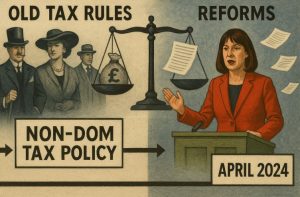The UK is undergoing a seismic shift in tax policy under the new Labour government, with Chancellor Rachel Reeves spearheading what she calls a necessary and overdue reform.
Central to this initiative is the abolition of the non-domicile, or “non-dom,” tax regime a system that has, for over two centuries, allowed certain wealthy individuals to avoid paying tax on their foreign income while residing in the UK.
Reeves’ flagship tax crackdown aims to generate billions for the public purse. However, early signs suggest that the policy may not deliver the anticipated fiscal gains.
Instead, it risks triggering a wave of capital flight, investor uncertainty, and reduced long-term tax revenue. This article explores the implications, challenges, and potential outcomes of Rachel Reeves’ tax reforms.
What Is the Rachel Reeves Tax Crackdown and Why Was It Introduced?

The tax crackdown announced by Rachel Reeves as part of her first budget as Chancellor marks a defining shift in the UK’s approach to high-income tax management.
The centrepiece of this policy is the abolition of the non-domicile regime, a 200-year-old framework that allowed wealthy UK residents to avoid taxation on income earned abroad by claiming a foreign domicile.
Rachel Reeves introduced this change with the aim of promoting tax fairness. The existing system was widely criticised for enabling ultra-wealthy individuals to benefit from UK services and infrastructure without contributing their fair share in taxes.
The reform is expected to remove the concept of “domicile” from the UK tax system starting April 2025.
The objective behind the policy is to level the playing field. Reeves projected that the removal of the non-dom regime would bring in approximately £3.8 billion over five years, which would help stabilise the public finances.
How Will the Abolition of the Non-Dom Regime Affect Tax Revenue?
The initial intention behind this policy was to boost tax income. The Office for Budget Responsibility forecasted that it could generate billions in additional revenue. However, these projections rely on uncertain behavioural assumptions.
The challenge lies in estimating how non-doms will respond. The OBR assumed that between 12% and 25% of non-doms would leave the UK due to the policy change.
If the number leaving turns out to be significantly higher, the actual revenue gained could fall far short of expectations.
Real estate trends and financial service feedback already suggest signs of departure. Some international tax advisers and private banks report increased client queries about relocation.
The danger is that by removing the preferential tax structure without offering a viable alternative or transition period, the government may lose more in tax receipts from departing residents than it gains from those who stay and comply.
What Are the Economic Risks of the New Tax Rules?

The economic risks associated with Rachel Reeves’ new tax rules are broad, far-reaching, and largely dependent on how non-doms respond to the abolition of their long-standing tax benefits.
While the policy is positioned as a move toward fairness and fiscal responsibility, its unintended consequences may outweigh the initial gains if not carefully managed.
At the heart of the concern is the behaviour of high-net-worth individuals who previously enjoyed favourable tax treatment under the non-dom regime.
These individuals often contribute not just through direct taxation but by stimulating broader economic activity across sectors like real estate, financial services, and private equity.
If a significant number choose to leave the UK or redirect their investment plans, it could result in a measurable decline in both short-term tax receipts and long-term economic growth.
Potential Impacts on Economic Activity
Non-doms have historically played a disproportionate role in driving entrepreneurial activity and high-value investment in the UK. Their financial involvement goes beyond personal wealth, often extending to:
- Funding of UK-based startups and scale-ups
- Investment in commercial property and infrastructure
- Support for the private healthcare, education, and luxury service sectors
Removing a key tax incentive may cause many of these individuals to reduce or entirely withdraw their financial engagement in the UK, affecting employment and economic productivity.
Risk of Wealth Relocation
The international mobility of wealth means that many non-doms have the option to simply move their assets — and in some cases, their physical residence — to jurisdictions with more favourable tax environments. Countries like Italy, Switzerland, the UAE, and Portugal offer tax incentives specifically designed to attract global wealth.
If even a modest share of current non-doms chooses to relocate, the UK risks losing both existing and future tax revenue streams.
This potential relocation poses three core threats:
- Loss of foreign income remittances: With fewer high-income individuals residing in the UK, the amount of remitted foreign earnings subject to UK taxation will drop.
- Reduced economic consumption: Non-doms are significant consumers of high-value goods and services, from luxury retail to private education. Their departure could impact those sectors.
- Lower long-term capital investment: As wealthy individuals and their family offices relocate, the UK’s pipeline of private investment may suffer.
Pressure on the Financial Services Sector
London’s status as a global financial hub partly relies on its ability to attract and retain high-value individuals and the businesses they create.
Private banks, wealth managers, and investment advisers all benefit from servicing non-dom clients. A widespread exit from this group could lead to:
- Job losses in finance, legal, and accountancy professions that support global wealth structures
- Decreased demand for luxury residential and office space
- Dampened innovation in the fintech and asset management sectors
The shift in client base could also impact the UK’s attractiveness as a headquarters location for international financial institutions.
Investor Confidence and Market Perception
Beyond the immediate financial implications, there are concerns about how the policy will influence investor sentiment. Policy reversals or unexpected tax reforms can lead to perceptions of instability, especially when they affect globally mobile capital.
This could deter not only individuals but also multinational corporations from making long-term commitments to the UK.
Could the Policy Backfire on the Labour Government?
Labour’s position on tax equity is politically strategic, but policy execution carries a risk of misfire.
If the measure fails to deliver on revenue goals while triggering high-profile exits from the UK, the government may face backlash not just from business leaders but from within its own economic advisory circles.
The credibility of Rachel Reeves as Chancellor is also tied closely to the outcome of this policy.
A significant shortfall in expected tax income could undercut Labour’s financial strategy and weaken its mandate to reform other sectors like healthcare, housing, and education.
Below is a simplified look at the projected versus potential outcomes:
| Metric | Government Estimate | Potential Reality (If 30%+ Leave) |
| Additional Tax Revenue | £3.8 Billion | Less than £2 Billion |
| Non-Dom Departure Rate | 12% to 25% | Over 30% |
| Impact on Investment | Minimal | Moderate to Severe |
| Net Effect on Economy | Positive | Potentially Negative |
How Are Property Markets Reacting to the Non-Dom Exodus?

The UK’s prime property market, particularly in central London, is experiencing significant tremors following the announcement of Rachel Reeves’ tax crackdown on non-doms.
Wealthy individuals, especially those who previously benefited from the favourable tax treatment under the non-dom regime, have traditionally been key players in the high-end residential real estate sector.
With the planned abolition of these tax privileges set to take effect in April 2025, early indicators suggest a noticeable shift in buyer behaviour, leading to reduced demand and a potential market downturn.
Decline in Luxury Property Transactions
One of the clearest signals of the non-dom exodus is the sharp drop in transactions within London’s most exclusive neighbourhoods.
According to data from LonRes, an independent property data provider, transactions for prime properties in May 2025 were down 35.8% compared to the same period in 2024.
When compared to pre-pandemic levels, the figures are even more concerning, showing a 33.5% drop from the historical average.
These statistics suggest more than just seasonal or cyclical fluctuations. Estate agents and property consultants report that many potential buyers who fall within the non-dom category are either:
- Postponing property purchases until the tax changes are fully clarified
- Cancelling deals altogether due to the perceived financial disadvantages of remaining in the UK
- Selling existing assets in anticipation of relocating abroad
This creates a climate of uncertainty that is slowing down activity at the very top end of the housing market.
Impact on Property Values and Associated Sectors
With fewer high-net-worth individuals looking to buy, the natural result is downward pressure on prices, especially in areas like Mayfair, Knightsbridge, Belgravia, and Kensington.
Properties that previously attracted bidding wars are now sitting longer on the market, sometimes undergoing multiple price reductions before receiving serious offers.
The effects are not confined to sellers alone. A slowdown in luxury property transactions affects a web of interconnected industries, including:
- High-end interior designers and architects
- Construction companies specialising in bespoke refurbishments
- Private security and concierge service providers
- Luxury furniture retailers and art consultants
Each of these industries depends heavily on the continuous inflow of wealth into the London housing market, and a drop in transactions at the top tier can cause a ripple effect through the entire property services ecosystem.
Shift in International Investor Sentiment
The UK has long been considered a safe haven for international property investors, not only for its relative political stability but also for its accommodating tax system.
For many non-doms, owning a property in London was part of a broader wealth preservation strategy.
The proposed tax changes have cast doubt on the UK’s position as a favourable destination for global capital.
International buyers, especially from Asia, the Middle East, and North America, are now reassessing whether it makes financial sense to maintain or expand their property holdings in the UK. In many cases, investors are diverting their attention to other global cities such as:
- Dubai, which offers zero income tax and a growing luxury property sector
- Milan and Rome, benefiting from Italy’s flat tax system for new residents
- Lisbon, still attractive under its modified Golden Visa scheme
These competing markets provide a combination of tax incentives, investment stability, and lifestyle offerings that make them appealing alternatives for wealthy global investors.
Possible Medium to Long-term Consequences
If the exodus of non-doms continues, the long-term consequences for the UK property market could be significant. These may include:
- A sustained dip in property values at the high end of the market
- Reduced foreign direct investment in UK real estate development projects
- Lower overall tax revenue from stamp duty, capital gains, and associated levies
There is also the risk of oversupply in the luxury housing segment if current owners begin to offload properties en masse before the new tax rules are fully implemented. This could further depress prices and strain market stability.
While the broader housing market across the UK remains influenced by other factors like interest rates and supply shortages, the non-dom exodus is emerging as a critical pressure point in the luxury property sector.
The coming months will be pivotal in determining whether this is a temporary adjustment or the beginning of a long-term structural shift.
Where Are Non-Doms Likely to Move Instead?

With the UK phasing out its unique tax offering, other jurisdictions are positioning themselves as attractive alternatives.
Several countries offer regimes that either mimic the benefits once found in the UK or provide comparable incentives to attract global wealth.
| Country | Incentive Offered | Annual Tax Treatment |
| Italy | €100,000 flat tax on foreign income | No extra tax on worldwide income |
| Portugal | NHR (Non-Habitual Residency) programme | Low tax rates for 10 years |
| UAE | No personal income tax | Zero tax on local and global earnings |
| Switzerland | Lump-sum taxation based on living expenses | Negotiable tax rates for residents |
| Singapore | No tax on foreign income (if not remitted) | Business-friendly residency incentives |
The decision to move will depend on the individual’s financial footprint, lifestyle preferences, and business interests. Still, the availability of alternatives makes relocation a viable and increasingly attractive option.
What Are the Long-Term Implications for UK Tax Policy?
The crackdown on non-doms signals a willingness to move towards a more universally applied tax system.
While this can promote fairness, it may also dampen the UK’s ability to compete for global capital.
The Labour Party has positioned this move as the beginning of a broader suite of economic reforms, which may include:
- Tighter regulation of offshore trusts
- Reassessment of inheritance tax policies
- Broader scrutiny of corporate tax arrangements
The long-term question is whether these reforms will attract or repel investment. The outcome may hinge on how the government balances enforcement with incentives and whether it introduces new schemes to keep the UK attractive to entrepreneurs and international investors.
Is There Still Time to Rethink the Tax Crackdown?
As of August 2025, there remains a window for revisions before the policy becomes active in April 2025.
Financial institutions and trade groups are urging the Treasury to consider more nuanced approaches, such as:
- Phased implementation over several years
- Carve-outs for entrepreneurs and job creators
- Exemptions or reductions for individuals investing in UK infrastructure or innovation
These proposals aim to preserve the principle of tax fairness while avoiding mass wealth flight and economic disruption.
However, any softening of the stance may be politically sensitive and could be perceived as favouring the wealthy, complicating Labour’s message.
What Should UK Residents and Investors Do Now?

With the new regime approaching, individuals and families impacted by the changes should begin preparations without delay. Key actions include:
- Reviewing global income structures with tax professionals
- Evaluating the benefits and risks of changing residency
- Planning wealth transfers and inheritance structures under the new rules
- Considering relocation options if continued tax efficiency is essential
By acting early, taxpayers can maintain compliance while preserving financial stability amid policy uncertainty.
Conclusion
The Rachel Reeves tax crackdown marks a pivotal shift in the UK’s fiscal policy, aiming to promote fairness by ending long-standing non-dom advantages.
While intended to raise revenue, early indicators suggest potential downsides including capital flight and reduced investment.
The policy’s full impact will unfold over time, but its success will depend on balancing tax justice with economic competitiveness.
For residents, investors, and policymakers alike, careful planning and ongoing dialogue will be essential in navigating this transformative period.
FAQs About Rachel Reeves Tax Crackdown
What does the end of the non-dom regime mean for wealthy UK residents?
It means that individuals who previously avoided UK tax on their global income by claiming non-dom status will now be required to pay full UK taxes on all income sources, starting in April 2025.
Why did Rachel Reeves target non-doms with this policy?
Rachel Reeves aimed to increase tax fairness and generate revenue for public services by targeting individuals who have historically benefited from favourable tax treatment without contributing proportionately.
Could this crackdown lead to capital flight from the UK?
Yes, evidence from the property market and anecdotal reports suggest many high-net-worth individuals are already relocating or preparing to do so, which could harm UK investment.
How can taxpayers prepare for the changes by 2025?
Affected individuals should consult tax advisers, assess their global income exposure, consider residency options, and review their financial structures to stay compliant under the new rules.
Are there any countries offering more favourable regimes for former UK non-doms?
Yes. Countries like Italy, Portugal, and the UAE offer competitive tax systems that may attract former UK non-doms seeking more lenient regimes.
Is there a risk Rachel Reeves could reverse or delay the policy?
While a reversal is politically risky, sustained evidence of economic damage could force the government to adjust the policy before implementation in 2025.
What long-term effects could this policy have on UK business investment?
The policy may deter future investment and entrepreneurial activity if the UK is no longer perceived as tax-efficient or welcoming to global talent and wealth.








